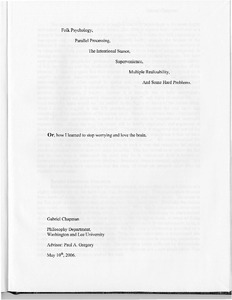| dc.rights.license | In Copyright | en_US |
| dc.creator | Chapman, Gabriel Michael | |
| dc.date.accessioned | 2023-10-20T15:49:18Z | |
| dc.date.available | 2023-10-20T15:49:18Z | |
| dc.date.created | 2006 | |
| dc.identifier | WLURG038_Chapman_thesis_2006 | |
| dc.identifier.uri | https://dspace.wlu.edu/handle/11021/36249 | |
| dc.description.abstract | The objective of this paper is to suggest that folk psychology is the most deeply entrenched myth in the history of the human race. Yet, it appears that -- considered as a theory of how the mind works -- we have ample reason to believe that folk psychology is inadequate and radically misleading. Its success hardly exceeds the bounds of the behavior it was engineered to explain, or behavior that has been socialized to conform to its categories. Folk psychology seems to bear little to no hope of being integrated, or making any significant contact with, our more fundamental physical sciences. Yet there exist professedly 'physicalist' philosophers who nevertheless propound the inviolability of folk psychology and the irreducibility of theories of the mental to theories of the physical. I want to suggest that their position is inherently tenuous. Folk psychology is usually defended hand-in-hand with anti-reductive positions on the mind-brain relationship, which often appeal to qualia and consciousness as especially 'hard problems' not amenable to physicalist explication. Both folk psychology and the hard problem are defended, I suspect, because it is thought that a fully materialistic perspective would not adequately characterize the breadth and depth of mental life. A story about the brain would not 'do justice' to the flights of fancy of the human mind. What I want to suggest is that folk psychology itself disguises the real depth and complexity of the capabilities of the human mind. Hence, I welcome Paul Churchland's model of mental representation, a model that does not rely on propositional, sentential representation. Along the way, his model will be briefly explicated, and arguments in favor of folk psychology will be addressed. Ultimately, it is suggested that part of the reason why we believe the mind is not amenable to physical description is that we have not yet, in our own minds, primed that domain for reduction. We have construed the domain itself, and what reduction should be, in such a way that reduction (of mental events to physical events) does not seem plausible. This has caused us to ignore the fact that the best way to understand the mind may be to incorporate both a bottom-up (neurophysiology) and a top-down (abstract, functional characterization) approach. Too
many philosophers have supposed that the study of mind can proceed apart from its physical instantiation. [From introductory section] | en_US |
| dc.format.extent | 28 pages | en_US |
| dc.language.iso | en_US | en_US |
| dc.rights | This material is made available for use in research, teaching, and private study, pursuant to U.S. Copyright law. The user assumes full responsibility for any use of the materials, including but not limited to, infringement of copyright and publication rights of reproduced materials. Any materials used should be fully credited with the source. | en_US |
| dc.rights.uri | http://rightsstatements.org/vocab/InC/1.0/ | en_US |
| dc.subject.other | Washington and Lee University -- Honors in Philosophy | en_US |
| dc.title | Folk Psychology, Parallel Processing, the Intentional Stance, Supervenience, Multiple Realizability, and Some Hard Problems: Or, How I Learned to Stop Worrying and Love the Brain | en_US |
| dc.type | Text | en_US |
| dcterms.isPartOf | WLURG038 - Student Papers | en_US |
| dc.rights.holder | Chapman, Gabriel Michael | en_US |
| dc.subject.fast | Ethnopsychology | en_US |
| dc.subject.fast | Brain -- Philosophy | en_US |
| dc.subject.fast | Philosophy of mind | en_US |
| local.department | Philosophy | en_US |
